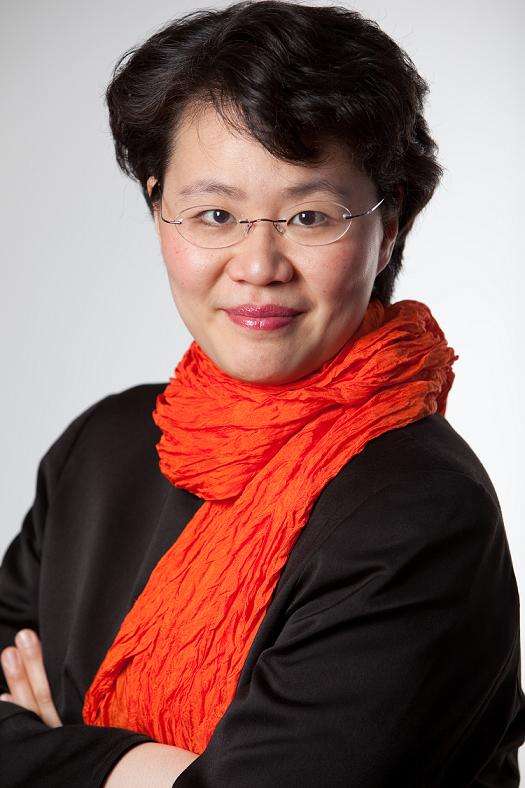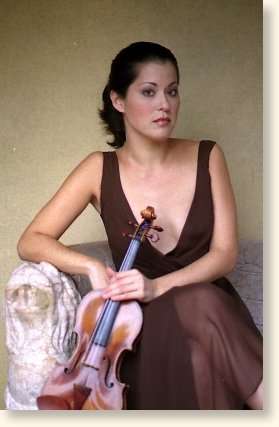|
Back
A Delectable Four-Course Meal Phoenix
Symphony Hall
03/03/2011 - & March 4, 5*, 2011
Max Bruch: Violin Concerto No. 1 in G minor op. 26
Richard Wagner: Siegfried-Idyll
Hans Krása: Overture for Small Orchestra
Felix Mendelssohn: Symphony No. 5 "Reformation" in D major op. 107
Jennifer Frautschi (violin)
The Phoenix Symphony Orchestra, Mei-Ann Chen (Conductor)

M.-A. Chen (Courtesy of PSO)
The program opens with Wagner's Siegfried-Idyll (1871). Composed as a statement of his love for his wife Cosima on the occasion of her thirty-third birthday surprise party, the piece was supposed to remain a private, family work. Later, the composer, pressed for funds, was forced to sell the manuscript. The "Siegfried" in the title does not refer to the third drama of the Ring Cycle, but to his infant son, born a few months before, and named, as it was the tradition in the "family", after the score on which Wagner was working.
Due to the large size of Symphony Hall, PSO plays the arrangement for full orchestra, contrary to the original 15-musician version. Inevitably, much of the intimacy is lost.
Newly appointed Musical Director of the Memphis Symphony Orchestra, guest conductor Mei-Ann Chen is a young, promising talent. She infuses warm-hearted, intimate passion to the orchestra. The string section plays admirably, producing a tender, caressing sound in the Lullaby that opens and ends this rapturous score. Principal Trumpeter Charles Berginc plays his 13 bars with great musicality and musicianship. One wonders if he was thinking, while playing, of Hans Richter, the original trumpeter, who had to row out in the middle of a lake, so Cosima would not hear him practice… A palatable appetizer.

J. Frautschi (© Richard Bowditch)
The pièce de résistance of this first part is a warhorse of the violin repertoire: Bruch's Violin Concerto No. 1. Jennifer Frautschi is no new kid on the block. In the past seven years, she has earned the reputation of a talented violinist, appearing with many respected orchestras and conductors. From the flourish of the Prelude to the fiery brilliance of the third movement Allegro energico, Frautschi remains unimpressed by the virtuoso challenges of the piece. The admirable sound of her 1772 Stradivarius literally confiscates the audience's attention, making her voyage through the score lush, tasteful, and convincing. Her rendition is marked by penetrating passion, (especially in the glowing Adagio), infectious vitality, and uncompromising technique.
Hans Krása's Overture for Small Orchestra is music for remembrance. Composed while he was incarcerated in Theriesenstadt, touted by Nazi propaganda as a "model concentration camp" (sic) of ethical treatment and flourishing artistic ventures, this small-scale orchestra score was most likely written as an overture to his thirty-five-minute opera for children Brundibár (The Bumblebee). Here again, due to the large volume of the auditorium, the orchestra uses twenty-eight musicians instead of the original thirteen. Regardless, we are grateful to Phoenix Symphony Orchestra to have programmed such rarity, as short as it is, and wish Krása's musical legacy were explored more often. Chen captures with eloquent sincerity this lighthearted music, staying away from mugging and garish sentimentality. A stirring moment.
Dessert takes the form of Mei-Ann Chen's account of Mendelssohn's Fifth Symphony. The first movement's grand processional is approached with an overstated solemnity that seems to subsequently make the stormy Allegro con fuoco sound like con "poco" fuoco. Soon Chen gains momentum in the lush dialogue between the strings and the winds, and seduces with the melodious, waltz-like interludes of the second movement. In the third movement, the string section is at its best and the overall impression is appropriately lyrical. Without a break, the orchestra moves into the Finale. From the opening Andante with Viviana Cumplido on flute, to the Allegro maestoso, and to the boisterous coda, Chen leads PSO with noticeable energy but somehow comes shy of the expected raucous splendor that concludes this work, leaving us with mixed feelings.
All in all, Mei-Ann Chen's interpretation of the four pieces is stamped with homogeneity, integrity, and conspicuous vigor. The Phoenix Symphony Orchestra, as always, demonstrates vitality, a good quality of attacks, with stunning strings, expressive woodwinds, and clear, strong brass.
Coffee, anyone?
Christian Dalzon
|